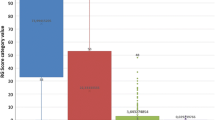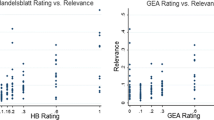Abstract
We explore perceived creativity in scholarship as it relates to scholarly reputation in the field of management. The effects of quantity (total refereed publications, national paper presentations) and quality (proportion of articles in premier journals, editorial activity, research awards) dimensions of scholarly activity are also considered. Our results suggest that the quality dimensions are positively associated with reputation, but that the perceived creativity of a scholar's work further influences reputation, and partially mediates the relationship between some quality measures and reputation. These results suggest that quality, creativity in particular, is more important than quantity for the accumulation of reputation.
Similar content being viewed by others
References
Amabile, T. M. (1988), A model of creativity and innovation in organizations. In: B. M. Staw, L. L. Cummings (Eds), Research in Organizational Behavior, Greenwich, CT: JAI Press, Vol. 10, pp. 123-167.
Amabile, T. M. (1996), Creativity in Context. Boulder, CO: Westview Press.
Amabile, T. M., Gryskiewicz, S. S. (1987), Creativity in the R&D Laboratory. Technical Report no. 30. Greensboro, NC: Center for Creative Leadership.
Bacharach, S. B. (1989), Organizational theories: some criteria for evaluation. Academy of Management Review, 14(4): 496-515.
Barron, R. M., Kenny, D. A. (1986), The moderator-mediator variable distinction in social psychological research: Conceptual, strategic, and statistical considerations. Journal of Personality and Social Psychology, 51(6): 1173-1182.
Beyer, J. M., Chanove, R. G., Fox, W. B. (1995), The review process and the fates of manuscripts submitted to AMJ. Academy of Management Journal, 38(5): 1219-1260.
Cable, D. M., Murray, B. (1999), Tournaments versus sponsored mobility as determinants of job search success. Academy of Management Journal, 42(4): 439-449.
Clemens, E. S., Powell, W. W., McIlwaine, K., Okamoto, D. (1995), Careers in print: Books, journals, and scholarly reputations. American Journal of Sociology, 101(2): 433-494.
Coan, R. W. (1968), Dimensions of psychological theory. American Psychologist, 23: 715-722.
Coan, R. W., Zagona, S. V. (1962), Contemporary ratings of psychological theorists. Psychological Record, 12: 315-322.
Cole, S., Cole, J. (1967), Scientific output and recognition: A study in the operation of the reward system in science. American Sociological Review, 32: 377-390.
Cole, S., Cole, J. (1973), Social Stratification in Science. Chicago: University of Chicago Press.
Coleman, S. R., Norman, D. A. (1999), Psychology of the scientist: LXXIX. Visibility of psychological research and the fickleness of audiences: A case study. Psychological Reports, 84: 447-456.
Crane, D. (1965), Scientists at major and minor universities: A study of productivity and recognition. American Sociological Review, 30: 699-714.
Crane, D. (1967), The gatekeepers of science: some factors affecting the selection of articles for scientific journals. American Sociologist, 1: 195-201.
Daft, R. L. (1984), Antecedents of significant and not-so-significant organizational research. In: T. S. Bateman, G. R. Ferris (Eds), Method and Analysis in Organizational Research, Reston, VA: Reston Publishing, pp. 3-14.
Dogan, M., Pahre, R. (1990), Scholarly reputation and obsolescence in the social sciences: Innovation as a team sport. International Social Science Journal, 42(3): 417-427.
Ericsson, K. A., Krampe, R. T., Tesch-Romer, C. (1993), The role of deliberate practice in the acquisition of expert performance. Psychological Review, 100: 363-406.
Gaston, J. (1978), The Reward System in British and American Science. New York: Wiley.
Glick, B. (1997), Survey Feedback from Surveys of Journal Reputations. INFORMS Committee Review of Organization Science.
Gomez-Mejia, L. R., Balkin, D. B. (1992), Determinants of faculty pay: An agency theory perspective. Academy of Management Journal, 35(5): 921-955.
Hagstrom, W. O. (1974), Competition in science. American Sociological Review, 39: 1-18.
Hasselback, J. R. (1996), The 1995–1996 McGraw-Hill Directory of Management Faculty. McGraw-Hill, Inc.
Helmreich, R. L., Spence, J. T., Beane, W. E., Lucker, G. W., Matthews, K. A. (1980), Making it in academic psychology: Demographic and personality correlates of attainment. Journal of Personality and Social Psychology, 39: 896-908.
James, L. R. (1982), Aggregation bias in estimates of perceptual agreement. Journal of Applied Psychology, 67: 219-229.
James, L. R., Brett, J. M. (1984), Mediators, moderators, and tests for mediation. Journal of Applied Psychology, 69(2): 307-321.
James, L. R., Demaree, R. G., Wolf, G. (1984), Estimating within-group interrater reliability with and without response bias. Journal of Applied Psychology, 69(1): 85-98.
Long, R. G., Bowers, W. P., Barnett, T., White, M. C. (1998), Research productivity of graduates in management: Effects of academic origin and academic affiliation. Academy of Management Journal, 41(6): 704-714.
Merton, R. K. (1973), The Sociology of Science. Chicago: University of Chicago Press.
Newman, J. M., Cooper, E. (1993), Determinants of academic recognition: The case of the Journal of Applied Psychology. Journal of Applied Psychology, 78(3): 518-526.
Oldham, G. R., Cummings, A. (1996), Employee creativity: Personal and contextual factors at work. Academy of Management Journal, 39(3): 607-634.
Ostroff, C. (1992), The relationship between satisfaction, attitudes, and performance: An organizational level analysis. Journal of Applied Psychology, 77(6): 963-974.
Over, R. (1982), The durability of scientific reputation. Journal of the History of the Behavioral Sciences, 18: 53-61.
Quandt, R. E. (1976), Some quantitative aspects of the economics journal literature. Journal of Political Economy, 84: 741-755.
Sackett, P. R., Larson, J. R. (1990), Research strategies and tactics in industrial and organizational Psychology. In: M. D. Dunette, L. M. Hough (Eds), Handbook of Industrial and Organizational Psychology, 2nd Edition, Palo Alto, CA: Consulting Psychologists Press, Vol. 1, pp. 419-489.
Shalley, C. E. (1991), Effects of productivity goals, creativity goals, and personal on individual creativity. Journal of Applied Psychology, 76(2): 179-185.
Shalley, C. R., Gilson, L. L., Blum, T. C. (2000), Matching creativity requirements and the work environment: Effects on satisfaction and intentions to leave. Academy of Management Journal, 43(2): 215-233.
Simonton, D. K. (1991), Emergence and realization of genius: The lives and works of 120 classical composers. Journal of Personality and Social Psychology, 61: 829-840.
Simonton, D. K. (1997), Creative productivity: A predictive and explanatory model of career trajectories and landmarks. Psychological Review, 104(1): 66-89.
Simonton, D. K. (2000a), Methodological and theoretical orientation and the long-term disciplinary impact of 54 eminent psychologists. Review of General Psychology, 4(1): 13-24.
Simonton, D. K. (2000b), Creative development as acquired expertise: Theoretical issues and an empirical test. Developmental Review, 20: 283-318.
Sobel, M. E. (1982), Asymptotic confidence intervals for indirect effects in structural equations models. In: S. Leinhart (Ed.), Sociological Methodology, San Francisco: Jossey-Bass, pp. 290-312.
Social Science Citation Index (2000), Philadelphia, PA: Institute for Scientific Information.
Stack, S. (1994), An analysis of the impacts of books and journal articles. International Review of Modern Sociology, 24(2): 119-125.
Swanson, L., Trahan, M. (1986), Characteristics of frequently cited articles in learning disabilities. Journal of Special Education, 20: 167-182.
Trieschmann, J. S., Dennis, A. R., Northcraft, G. R., Niemi, A. (2000), Serving multiple constituencies in business schools: M. B. A. program versus research performance. Academy of Management Journal, 43(6): 1130-1141.
Tsui, A. S. (1984), A role set analysis of managerial reputation. Organizational Behavior and Human Performance, 34: 64-96.
Von Bakanic, V., McPhail, C., Simon, R. (1987), The manuscript review and decision-making process. American Sociological Review, 52: 631-642.
Weick, K. E. (1989), Theory construction as disciplined imagination. Academy of Management Review, 14(4): 516-531.
Whetten, D. A. (1989), What constitutes a theoretical contribution? Academy of Management Review, 14(4): 490-495.
Woodman, R. W., Sawyer, J. E., Griffin, R. W. (1993), Toward a theory of organizational creativity. Academy of Management Review, 18: 293-321.
Zhou, J. (1998), Feedback valence, feedback style, task autonomy, and achievement orientation: interactive effects on creative performance. Journal of Applied Psychology, 83(2): 261-276.
Zivney, T., Bertin, W. (1992), Publish or perish: What the competition is really doing. Journal of Finance, 47: 295-329.
Author information
Authors and Affiliations
Rights and permissions
About this article
Cite this article
Dewett, T., Denisi, A.S. Exploring scholarly reputation: It's more than just productivity. Scientometrics 60, 249–272 (2004). https://doi.org/10.1023/B:SCIE.0000027796.55585.61
Issue Date:
DOI: https://doi.org/10.1023/B:SCIE.0000027796.55585.61




